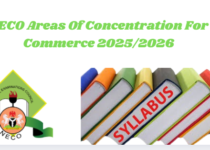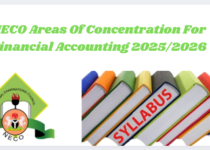NECO Areas Of Concentration For Igbo Language 2025/2026
NECO Areas Of Concentration For Igbo Language 2025/2026: A thorough understanding of the Igbo language, literature, and culture is essential for anyone seeking to fully appreciate the Igbo people. The Igbo syllabus has been developed to help candidates study these areas comprehensively. It ensures that candidates gain a solid foundation in the language’s sound system, grammar, cultural aspects, worldview, and more, providing a well-rounded education.
The objectives of the Igbo syllabus are clear: to help candidates speak, read, and write Igbo effectively; to familiarize them with the language’s sound system and grammatical structures; to expose them to Igbo culture, customs, and worldview; and to equip them with the tools needed for creative writing and the appreciation of Igbo literature.
The examination for Igbo language consists of two papers: Paper 1 and Paper 2, both taken in one sitting. Paper 1 contains sixty multiple-choice questions divided into three sections: Language, Literature, and Culture. The questions in Language cover areas such as comprehension, composition, sound system, grammar, and translation. The Literature section focuses on literary appreciation, oral literature, prose, poetry, and drama. Culture addresses Igbo customs and institutions.
Paper 2 is a composition test with three sections that align with the syllabus. Candidates are expected to demonstrate their understanding and application of the knowledge acquired in both the language and cultural aspects of Igbo. This comprehensive approach ensures that candidates are well-prepared for the exam and have a deep understanding of Igbo language, culture, and literature.
Contents
NECO Areas Of Concentration For Igbo Language 2025/2026
Section A: Language
- Composition/Letter Writing: Write an essay (300 words) on one of five topics, such as narrative, descriptive, argumentative, expository, dialogue, debate, or letter writing. Candidates should allocate 45 minutes.
- Sound System: Answer one of two questions on Igbo phonemes, syllable structure, sound processes, tone notation, and the Igbo alphabet.
- Grammar: Answer one of two questions on spelling rules, word formation, dialects, loan words, word classes, grammatical categories, sentence structure, punctuation, and more.
Section B: Literature
- Oral Literature: Answer one question on oral traditions, including proverbs, folktales, myths, legends, riddles, chants, and oral drama. Focus on prescribed texts.
- Written Literature: Answer one question on written literature, including prose, poetry, and drama based on prescribed texts.
Section C: Culture
- Customs (Omenala): Answer one question on Igbo customs, including rituals, ceremonies, festivals, child-rearing practices, beliefs, and traditional games.
- Institutions (Ewumewu): Answer one question on Igbo social and political institutions, such as family structure, traditional leadership, marriage, and community organizations.
Recommended texts for NECO Igbo:
Year | Prose | Poetry | Drama
- 1981-83:
- Oral: Qmalinze, Abx Na Egwuregwu Qd[nala
- Written: Urunwa, Akpa Uche, Jxq Obinna Eke, Nne Obidiya
- 1987:
- Oral: Abx Na Egwuregwu Qd[nala
- Written: Chinagqrqm, Xtara Nt[, Ugomma
- 1988:
- Written: Obiefuna, Akpa Uche, Akx Fechaa
- 1989:
- Written: Xwaezuoke, Akpa Uche, Akx Fechaa
- 1990:
- Written: Xwad[egwu, Nkemakqlam, Obidiya
- 1998-2000:
- Oral: Qka Mgba, Mbemna Egwu Igbo
- Written: Dinta, Akq Bx Ndx, Qnxkwube, Qkpa Akx Eri Eri, Akpa Uche, Okwe Agbaala
- 2002-2005:
- Oral: Qmalinze, Abx Na Egw egwuregwu Qd[nala
- Written: Jxqchi/Adaeze, Xtara Nt[, Udo Ka Mma, Echiche Miri Emi, Ajq Obi
- 2006-2010:
- Oral: Qka Mgba, Abx Akwamozu
- Written: Ihe Qjqq Gbaa Afq, Echiche Nwata Bulie Nna Ya Elu
- 2011-2015:
- Oral: Mbediogu, Abu Na Egwuregwu
- Written: (missing written works for this period)
List of Igbo texts for consideration: 2025-2026
ORAL WRITTEN PROSE Ezennxnx Xwa Ad[gh[ Ka Echere Agxgx M.O. KanxNgozi F. Eke Na Egwurugwu NdidiAmaka Nwadike I.U. Okoro C.L Qka Mgba AnxGbaaAjqqsq Iroaganachi J. Qfqmata C. Xwa Bx Agha Nwadike I.U. QdiXkonaMba Okebalama C.N. OkeSoroNgwere Okechukwu Ihejirika POETRY Abx Akwamaozu AkqnaUche Xzqchukwu S Echebima G.N MbemnaEgwu Igbo Akqnuche Qgbalx F.C. Nwadike I.U
- DRAMA Nke M JiKa
- Nwaozuzu G.I.
- Amagh[ Igbo AsxOyibo
- Okeke C.
- Nka D[ naNt[
- OkoroEmeka
- AfereChukwuemeka O.
- Ka{ Ma Nke A…..
- AgxgxM.O
How to Pass Neco English Language examination in 2025
Preparing for the NECO Igbo Language exam? Follow these strategies to succeed:
- Understand the Exam Format: Familiarize yourself with the exam structure to manage your time effectively.
- Study the Syllabus: Focus on the recommended textbooks and topics outlined in the syllabus.
- Practice Past Questions: Use past questions on Green Bridge CBT to identify weak areas and improve.
- Develop Language Skills: Practice reading, writing, listening, and speaking in Igbo regularly.
- Expand Your Vocabulary: Learn new words using flashcards, online resources, and Igbo dictionaries.
- Improve Grammar: Master grammar rules and sentence construction, including tenses and prepositions.
- Time Management: Allocate time for each section to ensure you complete all questions.
- Seek Guidance: Ask teachers or classmates for help if needed.
- Use JAMB CBT Practice: Use the Green Bridge CBT app to familiarize yourself with computer-based exams.
- Stay Calm: On exam day, stay confident and trust your preparation.


